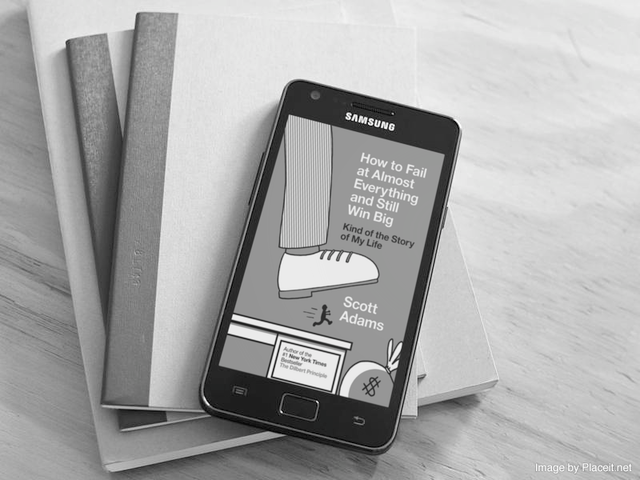This year, instead of setting goals, I’m going to try creating systems. I’ve been reading a great new book by Scott Adams that dives into the psychology of why New Year’s resolutions and personal development goals don’t work. The book is called ‘How to Fail at Almost Everything and Still Win Big: Kind of the Story of My Life‘ and it’s so good that instead of reviewing it, I’ve reprinted an excerpt so that you can hear directly from Scott. I’ve pieced together this except myself using a few of my favourite chapters. The excerpt is just a sample of the key ideas and you really should buy the book.
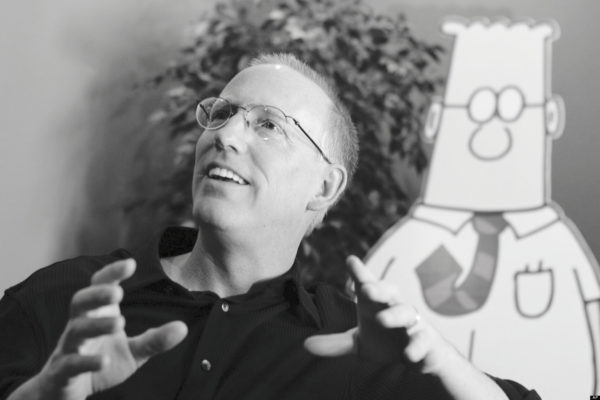
Scott Adams is the creator of Dilbert, one of the most popular and widely distributed comic strips of the past quarter century. He has been a full-time cartoonist since 1995, after sixteen years as a technology worker for companies like Crocker National Bank and Pacific Bell. His many bestsellers include The Dilbert Principle and Dogbert’s Top Secret Management Handbook. Enter Scott Adams…
How to Fail at Almost Everything and Still Win Big (Sample)
I’m not an expert in any of the topics in this book. But I am a professional simplifier. My main job for the past few decades has been creating the Dilbert comic strip. Making comics is a process by which you strip out the unnecessary noise from a situation until all that is left is the absurd-yet-true core.
I wish I could give you a surefire formula for success, but life doesn’t work that way. What I can do is describe a model that you can compare with your current way of doing things.
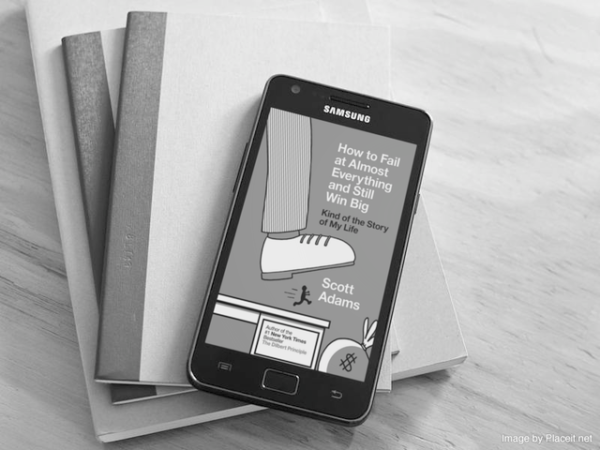
Highlights:
- Goals are for losers.
- Your mind isn’t magic. It’s a moist computer you can program.
- The most important metric to track is your personal energy.
- Every skill you acquire doubles your odds of success.
- Happiness is health plus freedom.
- Luck can be managed, sort of.
- Conquer shyness by being a huge phony (in a good way).
- Fitness is the lever that moves the world.
- Simplicity transforms ordinary into amazing.
Passion Is Bullshit (From chapter 3)
You often hear advice from successful people that you should “follow your passion.” That sounds perfectly reasonable the first time you hear it. Passion will presumably give you high energy, high resistance to rejection, and high determination. Passionate people are more persuasive, too. Those are all good things, right?
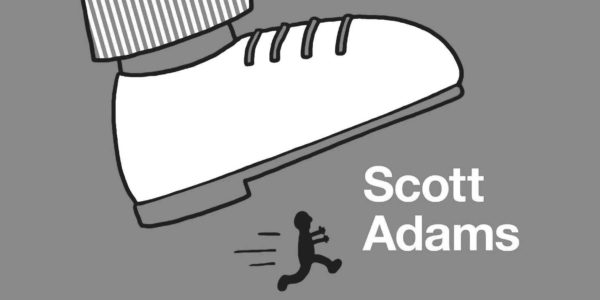
My hypothesis is that passionate people are more likely to take big risks in the pursuit of unlikely goals, and so you would expect to see more failures and more huge successes among the passionate. Passionate people who fail don’t get a chance to offer their advice to the rest of us. But successful passionate people are writing books and answering interview questions about their secrets for success every day. Naturally those successful people want you to believe that success is a product of their awesomeness, but they also want to retain some humility. You can’t be humble and say, “I succeeded because I am far smarter than the average person.” But you can say your passion was a key to your success, because everyone can be passionate about something or other. Passion sounds more accessible.
It’s also mostly bullshit.
It’s easy to be passionate about things that are working out, and that distorts our impression of the importance of passion. I’ve been involved in several dozen business ventures over the course of my life, and each one made me excited at the start. You might even call it passion. The ones that didn’t work out—and that would be most of them—slowly drained my passion as they failed. The few that worked became more exciting as they succeeded.
If you ask a billionaire the secret of his success, he might say it is passion, because that sounds like a sexy answer that is suitably humble. But after a few drinks I think he’d say his success was a combination of desire, luck, hard work, determination, brains, and appetite for risk.
So forget about passion when you’re planning your path to success. In the coming chapters I’ll describe some methods for boosting personal energy that have worked for me. You already know that when your energy is right you perform better at everything you do, including school, work, sports, and even your personal life. Energy is good. Passion is bullshit.
Goals Versus Systems (From chapter 6)
Goals are for losers. For example, if your goal is to lose ten pounds, you will spend every moment until you reach the goal—if you reach it at all—feeling as if you were short of your goal. In other words, goal-oriented people exist in a state of nearly continuous failure that they hope will be temporary. That feeling wears on you. In time, it becomes heavy and uncomfortable. It might even drive you out of the game.
If you achieve your goal, you celebrate and feel terrific, but only until you realize you just lost the thing that gave you purpose and direction. Your options are to feel empty and useless, perhaps enjoying the spoils of your success until they bore you, or set new goals and reenter the cycle of permanent pre-success failure.
The system-versus-goals model can be applied to most human endeavors. In the world of dieting, losing twenty pounds is a goal, but eating right is a system. In the exercise realm, running a marathon in under four hours is a goal, but exercising daily is a system. In business, making a million dollars is a goal, but being a serial entrepreneur is a system.
For our purposes, let’s say a goal is a specific objective that you either achieve or don’t sometime in the future. A system is something you do on a regular basis that increases your odds of happiness in the long run. If you do something every day, it’s a system. If you’re waiting to achieve it someday in the future, it’s a goal.
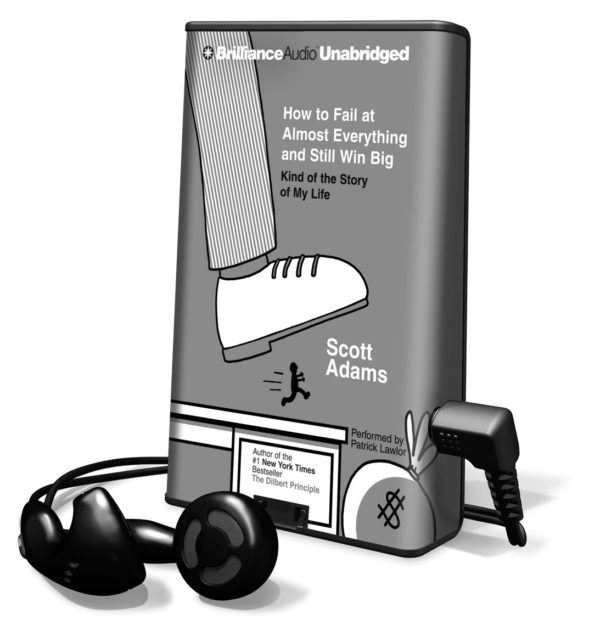
Summary (From chapter 36)
Look for patterns in every part of life, from diet to exercise to any component of success. Try to find scientific backing for your observed patterns, and use yourself as a laboratory to see if the patterns hold for you.
Most important, understand that goals are for losers and systems are for winners. People who seem to have good luck are often the people who have a system that allows luck to find them. I’ve laid out some systems in this book that seem to work for me. Your experience will differ, but it always helps to be thinking in terms of systems and not goals.
The model for success I described looks roughly like this: Focus on your diet first and get that right so you have enough energy to want to exercise. Exercise will further improve your energy, and that in turn will make you more productive, more creative, more positive, more socially desirable, and more able to handle life’s little bumps.
Once you optimize your personal energy, all you need for success is luck. You can’t directly control luck, but you can move from strategies with bad odds to strategies with good odds.
Happiness is the only useful goal in life. Unless you are a sociopath, your own happiness will depend on being good to others. And happiness tends to happen naturally whenever you have good health, resources, and a flexible schedule. Get your health right first, acquire resources and new skills through hard work, and then look for an opportunity that gives you a flexible schedule.
Some skills are more important than others, and you should acquire as many of those key skills as possible, including public speaking, business writing, a working understanding of the psychology of persuasion, an understanding of basic technology concepts, social skills, proper voice technique, good grammar, and basic accounting.
And always remember that failure is your friend. It is the raw material of success. Invite it in. Learn from it. And don’t let it leave until you pick its pocket. That’s a system.
How to fail at anything and still win big is available from Amazon in Kindle (USA), Kindle (UK), Paperback, Hardback and Audiobook. It really is an excellent book and I’ll be using the ideas from the book to create systems and habits in 2014.
